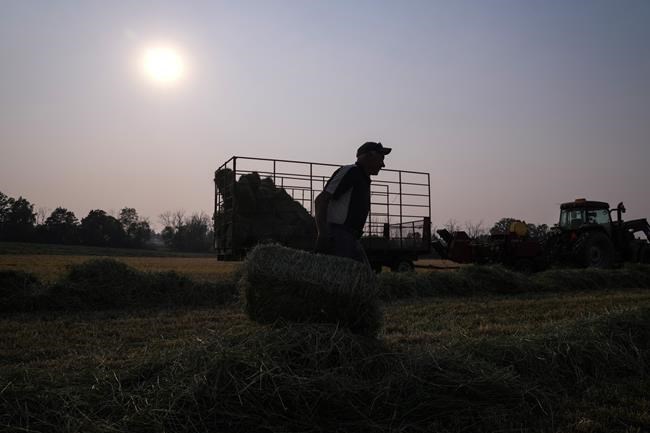OTTAWA — Canadian farmers may have to wait months to find out if they'll owe thousands of dollars for carbon pricing this year, as a bill that would give them a new exemption remains mired in political conflict.
The legislation has been a four-year odyssey to date.Â
Farmers seeking relief have argued there are few, if any, alternatives for them other than using natural gas to heat their barns and propane to dry their grain.
Kyle Larkin, executive director of the Grain Growers of Canada, said there is a lot of anxiety among farmers about what is going to happen.
"They thought we were going to get it passed in 2023, and here we are in 2024 with still a lot of politicking happening around the piece of legislation," he said.
Conservative MP Ben Lobb introduced Bill C-234 in 2022. It would implement an eight-year exemption from the carbon price for natural gas and propane used for heating farm buildings and drying grain.Â
An earlier version of the bill that exempted only propane died before passing when the 2021 federal election was called.
Last spring, Lobb's bill passed in the House of Commons with support of all parties except the Liberals, without garnering much attention.
But in the fall, as the Senate began to deal with it, the Liberals announced a different carve-out.Â
They exempted heating oil from the carbon price for three years after being heavily lobbied by Atlantic premiers and voters, who rely on heating oil the most.
That move — which the Liberals insist was meant to give people time to invest in electric heat pumps — was viewed by many as a political decision in response to Liberal poll numbers plummeting on the East Coast.Â
Prime Minister Justin Trudeau and Environment Minister Steven Guilbeault both said there would be no more carve-outs.
But the Conservatives ramped up their efforts to get the exemption for farmers passed as well.
The battle got so heated in the Senate there were allegations on both sides of the debate of bullying and harassment, including right on the Senate floor.
Conservative Sen. Don Plett apologized after acknowledging he lost his temper when he berated some senators for their moves on the bill.
Independent Sen. Bernadette Clement said police advised her to leave her home temporarily when she received threatening phone calls.
The Senate ultimately passed the bill in December, but with amendments that limited the exemption to propane for grain drying, and for just three years.
Procedures require the House to now decide whether to agree to the Senate's amendments or not. But that process is more complex than it sounds.
On Monday, the moment the House of Commons resumed following the Christmas break, Lobb moved a motion to reject the amendments and have the bill sent back to the Senate in its original form.
The NDP are voting in favour of that motion, as they did for the bill. The Liberals, with a few exceptions, are voting against it, Guilbeault said Wednesday.Â
"The prime minister and I have been very clear we don't want any new exemptions, and this would create a new exemption," Guilbeault said in an interview.
The Bloc QuĂ©bĂ©cois are more coy.Â
Both Leader Yves-François Blanchet and MP Yves Perron suggested Monday they might vote against the motion, saying they did not support the Conservatives' tactics in the Senate.Â
On Wednesday, Blanchet said the party hasn't yet decided what it will do.
"We are completing our thinking on that and we will all know together when we vote," he said.
That vote could be weeks away, depending on how long the Liberals choose to keep putting up MPs to speak to it. Because it is a private member's bill, there is limited time allocated for that debate.
When or if a vote finally happens, if the motion fails, the House still has to have another vote to decide what to do with the Senate amendments, and that could start the whole process over again.
If the motion passes, the bill has to go back to the Senate for it to decide whether to let the will of the House prevail — which is the custom — or refuse.
Lobb said Wednesday he wants the motion to be voted on swiftly, but he acknowledged that if it fails the next steps are murky.
"It's quite a complicated process, to be honest with you," he said.
Larkin said farmers, meanwhile, are facing bills that can add thousands of dollars in costs per year. The Grain Farmers of Ontario said their farmers could pay $2.7 billion in carbon pricing by 2030 if there is no exemption.
Farmers are already exempted from paying the carbon price on gas and diesel used in farm vehicles and machinery because there are no alternatives for them to choose.
Larkin said the same arguments can be made for barn heating and grain drying.Â
Some experts said during debate that farmers can invest in insulation and materials to lower their heating bills, and there are some higher-efficiency grain dryers available. But they all still require the use of fossil fuels.
Larkin said in eight years he expects technology may exist with alternatives, but it's not there now.
This report by The Canadian Press was first published Jan. 31, 2024.
— With a file from Stephanie Taylor.
Mia Rabson, The Canadian Press




